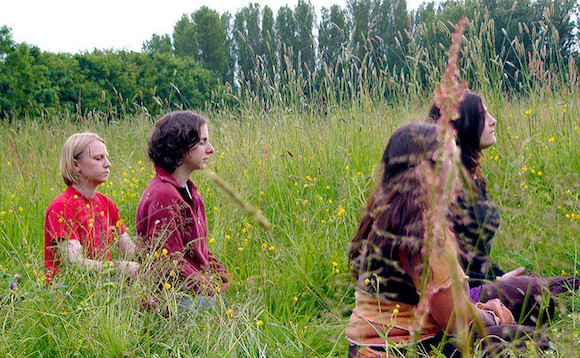-
About
- Our Work
- Get Involved
- Stay Updated
What next for YPARD's mentoring programs?

UPDATE: Please read the mentoring evaluation report at: http://www.ypard.net/resources/equipping-young-people-make-change-agriculture
John Dewey once said: "We do not learn from experience. We learn from reflecting on experience."
The YPARD members who have been actively involved in piloting a number of mentoring programs over the past 12 months have now entered a period of reflection - on their achievements, challenges and lessons learned.
In the spirit of collective learning, below is the monitoring and evaluation plan that we're planning to carry out over July and August. During this time, we'll also be publishing the stories of our mentees' amazing achievements.
You're all be invited to a lessons learnt webinar in late August or September to discuss of the findings and future plans. More info on that to come soon.
1. Project summary
The overall objective of the pilot is to examine different approaches to mentoring in order to understand how mentoring can best benefit YPARD members to develop careers that proactively contribute to innovative agricultural development
Project
Start date
End date
# mentees
# mentors
Face to face mentoring program in Kenya
June 2015
June 2016
15
15
Online mentoring program for women in business
November 2015
November 2016
14
14
The Youth in Landscapes mentoring program
December 2015
June 2016 or December 2016
5
5
The Young Agripreneurs Project
April 2016
April 2017
6
8
Face to face program in Kenya
This project seeks to provide YPARD members in Kenya with support and guidance to realise their potential by running multiple face to face workshops, providing ongoing coaching and meeting mentors for at least two hours each month either by phone or face to face. The theory underpinning this approach is that mentees will benefit most from having a mentor who they can meet face to face and who understands their local and national context. The rationale is that increased access to career building opportunities and support for young agricultural professionals will lead to innovation, community and cultural change and therefore sustainable agricultural development.
The project identified 15 YPARD members - an even mix of men and women who are farmers, students, entrepreneurs, young scientists and extension workers from across Kenya - to be the pilot mentees. These young people were paired with mentors based on the type of expertise and support that mentees said they were looking for. Their profiles are available at: http://www.ypard.net/
mentoring/profiles Online program for women in agribusiness
This project seeks to help YPARD women entrepreneurs across the world achieve key business goals by matching them up with business mentors and giving them access to online training materials and forums. The theory underpinning this approach is that mentees do not necessarily need face to face time with their mentor but will rather benefit from self-guided virtual learning and the global nature of the network. The rationale is that women will be economically empowered which will contribute to more equitable gender relations in society.
The project identified 14 of YPARD’s female entrepreneurs from Nepal, Tanzania, Rwanda, Malawi, India, Nigeria, Ghana, Uzbekistan, Madagascar and Kenya. The mentors are unknown to YPARD.
Youth in Landscapes Mentoring Program
This project seeks to help youth get the most out of conferences, by pairing youth delegates with senior delegates attending the Global Landscapes Forum and encouraging them to attend a conference session together. The theory underpinning this approach is that the initial face to face meeting between mentees and mentors is crucial and will sustain a virtual relationship. The rationale is that by having assistance to navigate the complexity of topics being discussed and by networking with senior professionals, youth will develop the skills and networks necessary to secure employment.
The project selected 22 youth from 17 countries and paired them with 22 senior professionals from business, government, NGOs and research institutions to attend the conference with. Five of these pairs were chosen to co-design a 6-12 month mentoring program, tailored to each of their needs. M&E will focus on these five pairs as evaluation has already been completed for in-conference only pairs.
Young Agripreneurs Project
This project seeks to support young entrepreneurs with innovative ideas for agricultural development by pairing them with multiple international and local mentors throughout a 12 month period. The theory underpinning this approach is that youth will have a myriad of different needs over a 12 month period and it will be useful and less burdensome for them to have multiple mentors they can call on. The rationale is that by increased access to career building opportunities and support for young agricultural professionals will lead to innovation, community and cultural change and therefore sustainable agricultural development.
The project selected 6 youth from 6 countries and has so far paired them with 8 senior professionals who have business expertise.
All of these projects aim to yield the following results:
Young people gain a clearer sense of purpose and goals as well as knowledge and skills about agriculture through their mentor’s guidance.
Young people improve their ability to contribute to innovative agricultural development.
Farmers, extension workers, academics become skilled mentors, providing appropriate training for young people.
Agricultural training opportunities are supported globally.
A network of mentors who regularly visit and support a network of young people in agriculture is established.
Improvements are made in youth employment (access to finance, more inclusive policy, educational reform, access to training etc.).
Project
Mentees’ needs (articulated at beginning of project)
Project objectives
Face to face mentoring program in Kenya
Get clarity on career direction
How to network
Identify like minded people to grow career
Share knowledge
Business skills - biz plan writing, pitching etc
Technical knowledge - best farming practices
Empower other young people
Reach more young people and help them to achieve their goals
Launch online business
Develop soft skills (e.g. communication, leadership, scientific writing etc) and share these skills with others
Get ideas from other professionals
To provide young professionals with support and guidance in the development of their careers in agricultural development;
To provide young professionals with insight into new and emerging opportunities and ways to engage with agricultural development;
To boost the confidence levels of young professionals to become more actively engaged in agricultural development;
To boost the skill and competency levels of young professionals in relation to those capacities that are in demand by employers in agricultural development;
To raise greater awareness from senior professionals about the value of young professionals and what they can bring to the discussion through the two-way mentoring program;
To enable senior professionals to learn from the young professionals.
To strengthen YPARD’s national, regional and global networks.
Online mentoring program for women in business
Business planning and management skills
Opportunity to create change
Financial support
Become a role model for other young people in agriculture
Learn more from different cultures and countries about doing business in agriculture
Create employment for others
Improve agribusiness in their country
Improve livelihood
Expand business
build business skills and digital literacy through online training platform
become part of a global community of committed, ambitious entrepreneurs who are invested in each other’s success
boost confidence
improve business performance
create wealth for the entrepreneurs
The Youth in Landscapes mentoring program
Guidance and feedback on research and professional work
Gain exposure to new knowledge and approaches
Opportunities to share knowledge and perspectives with more senior professionals
Access new career options and opportunities
Expand professional network
Support youth in identifying and working towards their professional goals
Encourage intergenerational dialogue and knowledge exchange on landscape and sustainability issues
Facilitate networking between young and more senior professionals
The Young Agripreneurs Project
Technical advice on implementing project
Business planning support and guidance
Financial support
Soft skill development - public speaking,
Be a source for information for many younger people in agriculture industry
Confidence
Access to a wide range of networks
Provide mentoring and seed capital to develop a business plan that is good enough to secure additional investment from sources external to GFAR
3. Purpose and objectives of the evaluation
The purpose of the evaluation is to inform ongoing implementation of the YPARD mentoring program and the development of a best practice mentoring model for youth in agriculture. Basically, we want to know what mix of approaches future mentoring programs should incorporate in order to satisfy the needs of YPARD members across the world in cost effective way?
 The evaluation is designed to:
The evaluation is designed to:examine the value of the four pilot programs for youth in agriculture and for innovative agricultural development.
identify what was delivered through the pilot
assess how well the components of the pilot were delivered
identify outcomes that were achieved for participants in the pilot
identify what lessons the pilot provides for the future implementation of mentoring for YPARD members.
The scope of the evaluation is the full implementation of the face to face mentoring program in Kenya between January and June 2014, 6 month monitoring of the online and youth in landscapes program and 3 month monitoring of the Young Agripreneurs program.
4. Key audiences
The following groups of people are interested in the evaluation findings:
YPARD: Management Team, Steering Committee, YPARD members.
Implementing Partners and Stakeholders: Heads of Organizations, Project Team leaders, and representatives of government, non-government, private sector, CSOs (INGOs, NGOs, other associations, universities) and community-based stakeholder organisations.
Donors: SDA, IFAD, FAO, Agropolis Foundation
Participants: Mentees and mentors who participated in the program.
5. Guiding questions
Assess the advantages and disadvantages of each mentoring approach.
To what extent did each project address the mentees’ needs?
To what extent did each project achieve intended results outlined in section 2.2?
For whom, in what ways and in what circumstances?
Were these intended results realistic, given the available inputs and the context in which the projects unfolded?
What were the particular features of the project and context that made a difference? What was the influence of other factors?
What were the key factors – negative and positive – that influenced implementation and the achievement of results? Are these generic, or specific to each project?
What are emerging as (potential) success factors, i.e., reasons for, or contributing factors to success? Are these generic, or specific to each project?
How likely is it that positive results achieved through the program/project will be sustained? What might be obstacles to such sustainability and how can they in future be mitigated/prevented?
Are any of the values or assumptions that underpin the design and implementation of the project/program inappropriate? Are there any implications that need to be considered, given the cross-cultural nature of the project/program?
To what extent have the mentoring projects helped young professionals realise their full potential?
To what extent have these projects contributed proactively towards innovative agricultural development?
6. Timeline
The qualitative data will be collected at different stages for the different programs.
Program
Qualitative data collection
Quantitative data collection
Face to face mentoring program in Kenya
June
June
Online mentoring program for women in business
July
July
The Youth in Landscapes mentoring program
July
July
The Young Agripreneurs Project
End August
End August
A draft report will be circulated to participants at the end of August. We plan to hold a YPARD webinar shortly thereafter to present and discuss the results.
Photos by SomeDriftwood, premasagar and Ky from Flickr.
About the author
Related Posts
Comments
No comments made yet. Be the first to submit a commentBy accepting you will be accessing a service provided by a third-party external to https://archive.ypard.net/
Get in touch
Email: [email protected]
YPARD Global Coordination UnitHosted by AGRIDEA and the Czech University of Life Sciences Prague
Lausanne, Switzerland and Prague, Czech Republic - Our Work

